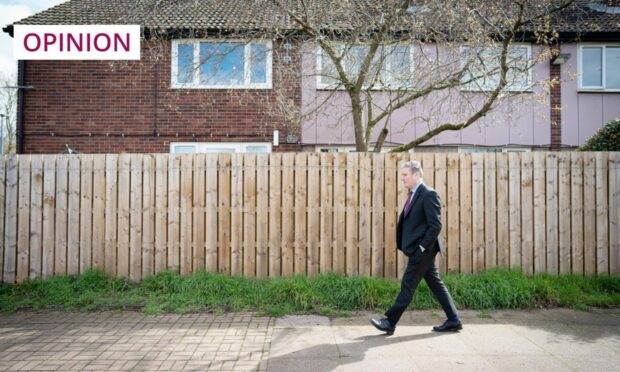Watching the Labour Party this week captured all the excruciating agony of witnessing an own goal, the ball sinking into the corner of the net in seeming slow motion.
How was it possible for Keir Starmer to compete with the moral bankruptcy of this UK Government’s succession of fibbers and flyweights? Gucci Sunak, poring over tax deductible private jet schemes in Downing Street, or an enraged Cruella de Braverman stabbing her stilettos through Rwandan plane timetables in the Home Office.
Unless, of course, he sanctioned a crass, ill-judged advertising campaign – with subliminally racist overtones that may, or may not, prompt memories of the infamous Rochdale abuse case – implying Sunak supports paedophiles.
“Do you think adults accused of sexually assaulting children should go to prison?” demanded the ad. “Rishi Sunak doesn’t. Under the Tories 4,500 adults convicted of sexually assaulting children under 16 served no prison time. Labour will lock up dangerous child abusers.” Is there any other kind of child abuser? What promise is being made here, exactly?

It was one of a series of adverts exposing the Conservative Party’s dismal record in office, but it was no accident that the most shocking and personally damaging landed first, before any context was created.
Labour seems to have swallowed the dangerous notion that any publicity is better than none, and all is fair in political war. Their reward? A drop in Starmer’s personal ratings.
No wonder. Is the Labour leader suffering from short-term memory loss? Just over a year ago, Boris Johnson accused him of failing to prosecute Jimmy Savile when he was director of public prosecutions (DPP). Johnson’s outburst prompted death threats against Starmer and was – rightly – widely condemned.
Johnson, Starmer said at the time, knew exactly what he was doing, but he didn’t want to discuss it further, “because I have young children and don’t want them to hear too much…” Sunak has two little girls of primary school age. Did Starmer care about them, too? Hypocrisy is never pretty.
Attack Sunak on his party’s record, not on bogus personal grounds
Public life and public service have become a coarse, dangerous affair: the murders of MPs Jo Cox and David Amess; the misogyny and racism hurled at MPs like Luciana Berger and Jess Phillips; the unacceptable threats of violence against MPs generally that have replaced legitimate, democratic dissent. But, when MPs themselves jump into cruddy waters – when leaders jump in – they create a culture that harms us all.
There were, Starmer said last year, “threats to too many politicians”, and everyone had a duty “to de-escalate these issues”. Is this his contribution?
Starmer played no role in the Savile case, but Johnson would subsequently claim: “I was making a point about his responsibility for the organisation as a whole.” There is a legitimate question here. To what extent does one individual carry the can for an organisation they lead?
Labour is the party of law and order. pic.twitter.com/EP6VXToK9z
— The Labour Party (@UKLabour) April 6, 2023
Presiding over an organisation when something bad happens does not seem to me to automatically make you personally responsible to the point of resignation. It’s a dangerous myth that any individual has complete control over anything in this world. But, you are personally responsible and should go if you preside over an organisation – the Met Police, for example – in which a culture exists that allows bad things to happen consistently, and which are covered up and ignored.
Attack Sunak on his party’s record, not on bogus personal grounds. As prime minister, he undoubtedly now carries responsibility for his government’s appalling record, including a broken justice system with broken values, but he wasn’t even an MP for part of the period Labour’s advert statistics relate to.
Historically, Starmer has had more direct influence over sentencing guidelines than Sunak has. Judicial change is necessary, but let’s be clear: the prime minister does not personally sentence paedophiles, nor should he.
Labour’s approach continues to betray abused children
The real reason we should all be angry about this is not to do with Sunak and Starmer, who have both chosen to be public figures. It’s because, in all this discussion about Sunak’s reputation, or Starmer’s lack of judgment, precious little is being said about those at the heart of the advert: the estimated half a million children who are abused annually in the UK.
Abuse is about power and control. There is something quite nauseating about the powerless and the voiceless being used, yet again, as pawns, caught up as silent collateral in somebody else’s dirty war.
Starmer changed prosecution attitudes for the better, but he still presided over a period when victims were dismissed because of their social status, and perhaps partly because of complex race issues
For generations, those children have been betrayed. They have been silenced and sidelined. Worse, they have been treated with contempt by multiple organisations that protected themselves rather than the vulnerable.
Starmer changed prosecution attitudes for the better as a result of Rochdale, when he was DPP, but he still presided over a period when victims were dismissed because of their social status, and perhaps partly because of complex race issues involved. The victims, as always, came last – a trend that Labour’s adverts have done nothing to change.
Catherine Deveney is an award-winning investigative journalist, novelist and television presenter, and Scottish Newspaper Columnist of the Year 2022











Conversation